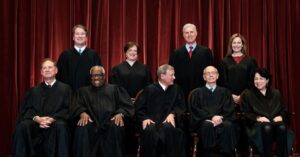There once was a time when U.S. Supreme Court nominees sailed blissfully through the confirmation process, with senators giving presidents all the latitude in the world to select the person of their choice. They asked some tough questions, occasionally, but were respectful and a bit deferential to presidential prerogative.
Not … any … longer.
President Biden is going to select a black woman to succeed Stephen Breyer on the court once Breyer retires at the end of the current court term. The president can expect a donnybrook. He might be able to find the most brilliant legal mind this side of the Magna Carta, but that person won’t be confirmed without shedding a good bit of blood as she takes incoming rounds from the Republican obstruction brigade in the Senate.
When did it come to this? I guess you could trace it to 1987, when President Reagan nominated Robert Bork to the SCOTUS. Bork was known to be a strict constitutional constructionist. He was a brilliant legal scholar, but he had some seriously offensive views about the role of women and racial minorities. His nomination went down in flames.
Then came the 1991 nomination of Clarence Thomas, whom President George H.W. Bush called the most brilliant legal mind in America. He sought to succeed the late Thurgood Marshall. Then came allegations of sexual harassment and the testimony of Anita Hill. The debate was ferocious. The Senate confirmed Thomas, but it was a narrow mostly partisan vote.
I am thinking at this moment of a nominee put forth by President Eisenhower in 1953. Earl Warren was governor of California when Ike asked him to join the court. He had never served as a judge. I wonder now how an Earl Warren nomination would fare in today’s climate. Would senators question his qualifications? Would they hold him to the same sort of careful examination that they appear ready to do to whomever Joe Biden presents? If the answer is yes, would Gov. Warren hold up?
For the record, I am glad Earl Warren served as chief justice, given that the court on his watch approved some amazing landmark rulings; e.g., Brown v. Board of Education.
I want President Biden’s first high court nominee to be judged carefully but fairly by senators. I am concerned they will respond with red herrings, specious arguments and phony concerns.
I remain committed, by the way, to presidential prerogative in these cases. Elections, as they say, do have consequences. I have been faithful to that truism with respect to whomever is in office.
So, let the process move forward. I hope for a semblance of judicial comity as the Senate ponders this most important selection.
